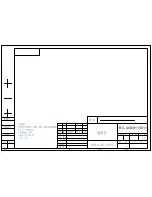
24
Picture Formats
What Is the Difference Between a Standard-Screen and a
Wide-Screen HDTV?
The type of screen your HDTV has (wide-screen or standard-screen) determines how
the set-top displays programs on the screen. The picture format for an HDTV is a
combination of
aspect ratio
and
screen resolution
and is different for standard-screen
and wide-screen HDTVs.
What Is Aspect Ratio?
An aspect ratio is the ratio of the width to the height of the TV screen. The aspect
ratios differ because the television industry manufactures both standard-screen and
wide-screen HDTVs to appeal to consumer viewing preferences.
What Is the Screen Resolution?
The screen resolution indicates the amount of detail that the picture displays.
Resolution is identifi ed by the number of display lines on the screen. The techniques
that an HDTV uses to “paint” the picture on the screen are referred to as progressive
and interlaced.
With the
progressive method
, every pixel on the screen is refreshed simultaneously.
The
interlace method
involves refreshing pixels in alternation — fi rst the odd lines
and then the even lines.
For advance setup, select the scan modes that your TV can support. Refer to your
HDTV user’s guide to choose the proper scan rates (480i, 480p, 720p, 1080i) for
your setup.
For example, a resolution of 1080i indicates that the screen shows 1080 lines in
an interlaced display, and 720p indicates that the screens shows 720 lines in a
progressive display.
Note:
The screen resolution is sometimes referred to as the scan rate. The terms are
interchangeable.
A
standard-screen HDTV
has a 4x3
aspect ratio. The screen is 4 units
wide for every 3 units tall.
A
wide-screen HDTV
is one-third wider than
a standard-screen HDTV. The screen is 16
units wide for every 9 units tall.
A screen resolution of 480i fi lls the
screen.
A screen resolution of 720p or 1080i fi lls the
screen.
16
9
4
3





























